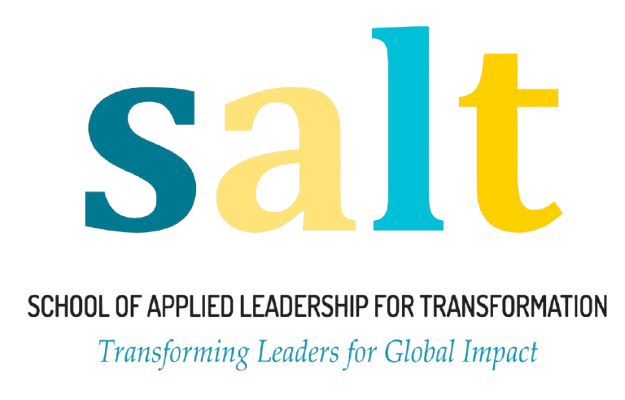Why SALT?
Also included on this page is information regarding our process overview
What makes SALT distinct from traditional theological education?
- It’s local: Students don’t need to relocate to attend the school. Learning is done in the location where each student lives and works.
- It’s customizable: Each student’s learning is contextualized and applied for the specific and unique life-setting of that student.
- It’s Learning Community-based: Students do individual work while also benefiting from group input, feedback, and any work done together as a team.
- It’s competency-based: The curriculum isn’t focused on how much time is spent in class or doing homework, nor on letter grades. Rather, it affirms at graduation that students have the integrated knowledge, skills, and character needed to be effective in personal and vocational life.
- It’s mentor-based: A Mentor Team of three people works with each student during the program. Each mentor focuses primarily (but not exclusively) on a specific area of the student’s development–one for academic development, another for vocational development, and the third for character development. in other areas of life.
- It’s cost effective: Being subscription-based means the sooner a student demonstrates proficiency, the sooner studies are complete. You will pay $3,600 per year. Compare that to the cost of the least expensive non-denominational seminary, which is around $35,500 per year.
- Christ-centered and faithful to the Bible: Students learn to study and apply God’s inspired, written word that is the basis for all SALT programs. Development focuses on students growing to love God, His word, and people more while deepening their relationship with Christ. Students will grow confidently and competently in applying biblical truths to everyday life and vocation.
- Focused on developing holistic, integrated competencies: The SALT curriculum focuses on the student developing integrated competencies involving in three areas: content (knowledge), character (values & attitudes) and craft (skills). Assessment focuses on the student being transformed to meet the curriculum’s holistic competencies in these areas.
- A customizable & relevant curriculum with immediate personal application: SALT is an online program that does not require students to leave their normal living location, and engages them in it since students learn better when academic work is immediately relevant to their lives and vocational contexts. In this way, SALT comes to the student instead of the student coming to the school. The curriculum can be customized for personal and vocational relevancy, which makes it highly contextualized.
- Individualized mentoring instead of classroom teaching: Completing the curriculum is a journey of discipleship that involves focused learning experiences and personal mentoring. Each student has three personal mentors (a Faculty Mentor, a Vocational Mentor, and a Life Mentor) who guide, support, and assess the demonstrated competencies for the student’s development.
- Peer-to-peer mentoring within a learning community team: While development is individualized, as much as possible, students progress together as a learning community through shared experiences. Learning together helps students experience specific aspects of biblical community, better understand team dynamics, and cultivate meaningful relationships.
- Builds stronger families: SALT students have found that applying the biblical principles and curriculum not only helped them excel academically, but also strengthened their marriage family relationships.
- Globally accessible & time flexible: Accessing curriculum Learning Experiences (LEs), which replace course-based learning found in traditional education, can occur from anywhere and at any time because they are online. This optimizes flexibility to a student’s individual scheduling needs. Mentoring and interacting with the student’s program Learning Community are done through arranged online meetings.
- Affordable: Having a school without residential buildings decreases operating costs, which makes it more affordable for students than attending a non-online school.
- Academically credible: SALT-CBTE partners with Kairos University, which is accredited by two US government-recognized accreditation agencies: the regional Higher Learning Commission (HCL) and the national Association of Theological Schools (ATS).
Typical Week for a Student:
- It’s local: Students don’t need to relocate to attend the school. Learning is done in the location where each student lives and works.
- It’s customizable: Each student’s learning is contextualized and applied for the specific and unique life-setting of that student.
- It’s Learning Community-based: Students do individual work while also benefiting from group input, feedback, and any work done together as a team.
- It’s competency-based: The curriculum isn’t focused on how much time is spent in class or doing homework, nor on letter grades. Rather, it affirms at graduation that students have the integrated knowledge, skills, and character needed to be effective in personal and vocational life.
- It’s mentor-based: A Mentor Team of three people works with each student during the program. Each mentor focuses primarily (but not exclusively) on a specific area of the student’s development–one for academic development, another for vocational development, and the third for character development. in other areas of life.
- It’s cost effective: Being subscription-based means the sooner a student demonstrates proficiency, the sooner studies are complete. You will pay $3,600 per year. Compare that to the cost of the least expensive non-denominational seminary, which is around $35,500 per year.
Distinctives & Features:
In Depth
The School of Applied Leadership for Transformation - SALT
SALT Competency Based Theology Education (CBTE) Process
Our curriculum involves several designated character outcomes with their related competencies and Learning Experiences (LEs). The LEs help students develop, defend, and dissect the related competencies.
Some competencies may be deemed already complete based on a student’s previous vocational and life life and vocational experience. When they are, a student is able to complete the program more rapidly and with less cost.
For all remaining program competencies, students begin by accessing the LEs related to each one. They then work on projects that require them to apply the acquired knowledge and skills, which in turn help them develop their vocational craft and character. Along the way, students interact regularly with the three mentors in their Mentor Team (MT) and receive peer-to-peer mentoring from other students who help each other develop the related content, character, and craft proficiencies.
When a student has finished the LEs and the Mentor Team is comfortable that the student has the related competency, the student is assessed. No grades are given in the assessment. Rather, students are assessed as either not yet competent or at some level of competency. If the student is not yet competent, the mentors and the student determine additional steps needed for competency. Once those steps are finished and competency is achieved, another assessment is given.
A student graduates when all program LEs are completed and the student’s MT has affirmed that each program competency has been developed at least at the minimal level.
Process Overview
- Learning online is done through the Pathwright LMS (learning management system), which:
- Provides the content curriculum the student needs to master.
- Allows personal learning access 24-hours every day of the year.
- Work is stored in a shared driven, which:
- Allows mentors easy access and the ability to add comments.
- Allows students to share work or do group work.
- Provides students with a repository of their work in the program
- Personal development involves a Mentor Team (MT):
- Three mentors (Faculty Mentor, Life Mentor, & Vocational Mentor) join the student on this journey of discipleship.
- These mentors serve as the student’s personal guides and resources in helping them complete the program LEs to develop the program competencies.
- Meetings with mentors individually or as an MT focus on building relationships, refining student development, and clarifying the curriculum process.
- Personal development also involves a Learning Community (LC):
- The LC relationships can be built in person where students are geographically connected or online where geographical distance exists.
- While LC meetings are facilitated by a Faculty Mentor, students help craft how these LCs are conducted.
- LCs allow students to experience peer-to-peer mentoring in addition to what each one experiences with an MT..
- The personal MT assesses the student’s competency:
- Competency assessments are called Master Assessments, one for each SALT Kingdom Leader Profile (KLP) Character Outcome.
- Each is a holistic look at the student’s progress on the SALT curriculum journey of discipleship.
- It occurs to affirm and celebrate what the student has accomplished by specific points along that journey.
- Graduation occurs when a student has completed all of the following required curriculum components and has been assessed as competent in the required competencies:
- Completing Starting Well (common to all degree programs)
- Completing all required Character Outcomes for the degree program.
How does the SALT process work?
SALT's Vision
The School of Applied Leadership for Transformation (SALT) is a global school without walls. In partnership with Kairos University (KU), students studying through SALT partnership programs receive KU accredited degrees.
SALT is a school within the International Leadership Consortium (ILC), an educational subsidiary of Campus Crusade for Christ, International. CCCI mission is to win, build, & send Christ-centered multiplying disciples who launch spiritual movements; it’s vision is having movements everywhere so that everyone knows someone who truly follows Jesus; and it’s core values are Faith, Growth, Fruitfulness.
The ILC is a growing global educational network serving the Church and parachurch organizations by building the spiritual leaders needed for the Great Commission.
- It’s purpose it to accelerate movements everywhere by spiritually impacting the world through developing leaders in every key segment of society to help fulfill the Great Commission and the Great Commandment.1
- It’s role is to maximize, through formal and non-formal education, the contribution of member institutions in equipping emerging and established Kingdom-minded, transformational leaders to build spiritual movements that transform society (Matt 28:18-20; Acts 1:8; Luke 4:17-21; Acts 10:38)
It’s educational core values are:
- Contextually demonstrated mastery
- Holistic leadership development (heart, head, hands)
- Spirit-filled, passionate disciples of Christ who make disciple-makers
- Personal and societal transformation (impact)
- Quality institutional leadership and internal assessment processes
It’s educational distinctives are:
- Biblically grounded, culturally relevant programs, including come competency-based programs
- Integrated leadership formation involving theological, leadership, intercultural, educational, and vocational studies to impact society
- Faculty members who disciple students through modeling, mentoring, coaching, and relationship building
- Excellence in the integration of academics and application (scholars who are practitioners & practitioners who are scholars)
- Effective cross-cultural ability
- Exposure to, training in, and reinforcement of transferable concepts, spiritual multiplication, and movement building expressed through incorporating Win-Build-Send to significantly impact the fulfillment of the Great Commission
Current SALT degrees available are: a combined Bachelors and Masters Degree (BA-MA), a Masters degree (MA), a Doctor of Ministry (DMin) degree, and a Doctor of Philosophy Degree (PhD) with specific specializations. Micro-credentials are also offered for specific focused learning, which can lead to these degrees when desired.
Vision and Need for SALT
Before universities were established in the Middle Ages in Europe, education was done by tutoring and apprenticeship. During the Western Enlightenment, knowledge in the universities became more segmented and specialized. That type of education spread globally through Western colonization in the 17th through early 20th centuries. While it has served well in many situations, it has several weaknesses that are now being challenged, which include recognizing that time in the classroom does not necessarily result in learning, and that it often lacks holistic integration, contextualization, and effective vocational application.
Competency-based Education (CBE) has arisen as an accredited alternative that seeks to correct these weaknesses. In addition, the increasing availability of effective internet access globally and the accessibility of information it provides, makes online education a feasible alternative to traditional classroom education.
A type of CBE is CBTE–Competency-based Theological Education, which includes within its curricula the teachings of the Bible as its educational worldview. SALT provides an online CBTE opportunity for those who want to stay in their home and vocation settings but receive this type of training. It does not distinguish between training for ministerial or secular work; rather, SALT curricula see all work as sacred based on God’s plan for a person’s life. With a built-in mentoring approach and integration of learning into the student’s current vocational context, it puts learning knowledge and skills into a more tutored and apprenticeship context along with personal character development.
Currently, it is estimated that as many as 50,000 seminary students graduate globally every year; however, there are more than 50,000 new churches planted every year. In addition, there are other churches whose pastors leave their leadership positions and their congregations are then without the trained care they need. Furthermore, it’s estimated that more than 90% of pastors globally are not theologically trained, which is often because the needed training is unaffordable or inaccessible from where it is needed. SALT makes the needed training both affordable, since it is scaled to the country’s GDP, and accessible, since it enables students to stay in their present context. Thus, it greatly enhances the potential to provide the additional trained leaders needed to meet the needs of the rapidly growing global Church. SALT’s vision includes helping train the needed leaders who will love God, love others, and advance His Kingdom as disciples of Jesus.
The design of the SALT curriculum works backward from what it wants to achieve to how it intends to achieve it. As such it is first impact-focused, then outcomes-oriented, then holistic competency-based, then student-sensitive, and finally mentor-facilitated theological education.
- As impact-focused education, it looks how those involved with the school will impact various areas of society for the Great Commission.
- As outcomes-oriented education, it identifies what the specific type of people are needed to affect that impact.
- As holistic competency-based education, it assesses how proficient students are with specific content, character, and craft areas of personal and vocational development.
- As student-sensitive education it makes necessary adjustments in discussion with a student to meet real personal and vocational needs, not what might be needed in some possible future.
- As mentor-facilitated education, it puts three mentors in an on-going relationship with each student (a many-to-one relationship with the student) rather than having the student be one student in a class (a one-to-many relationship with the teacher).
- As theological education, it integrates the teaching of the Bible into each learning experience to help develop a student’s biblical worldview.
What is Kairos University?
- Kairos is a global community (with the merger of 5 other seminaries to form Kairos University) focused on Christ-centered transformation.
- Kairos sees their peers as collaborators and co-workers in God’s service, not as competitors.
- Kairos is competency-based in their approach to theological education to work best contextually.
- Kairos is committed to developing quality pastoral and lay leaders for the Great Commission.
- To learn more about Kairos University, visit: https://kairos.edu/
What is the ILC?
A network of Campus Crusade for Christ International seminaries, universities, training centers, and affiliate institutions. The ILC is serving the global church by providing quality, accessible, and affordable theological training and leadership options for Christian leaders.
ILC seeks to spiritually impact the world by accelerating Great Commission movements everywhere through developing transformational leaders in every segment of society.
Many pastoral and lay leaders around the world are under-equipped and need both formal (degree granting) and non-formal theological education. ILC is poised to provide both types of theological education. In order to equip leaders with field readiness.
What is SALT?
and vision statements
Honoring Reviews
All Online
Individual Work Pace
Helps Build Families
Kairos University and ILC
What is Kairos University?
- Kairos is a global community (with the merger of 5 other seminaries to form Kairos University) focused on Christ-centered transformation.
- Kairos sees their peers as collaborators and co-workers in God’s service, not as competitors.
- Kairos is competency-based in their approach to theological education to work best contextually.
- Kairos is committed to developing quality pastoral and lay leaders for the Great Commission.
- To learn more about Kairos University, visit: https://kairos.edu/
What is the ILC?
A network of Campus Crusade for Christ International seminaries, universities, training centers, and affiliate institutions. The ILC is serving the global church by providing quality, accessible, and affordable theological training and leadership options for Christian leaders.
ILC seeks to spiritually impact the world by accelerating Great Commission movements everywhere through developing transformational leaders in every segment of society.
Many pastoral and lay leaders around the world are under-equipped and need both formal (degree granting) and non-formal theological education. ILC is poised to provide both types of theological education. In order to equip leaders with field readiness.
What allows ourselves to give accredited courses?
and where the need is being met.
In All That We Do
WE ARE
Christ Centered
Jesus Christ is the cornerstone of our faith, and is also the corner stone in our degree formulation.
Focused on continuing to move the Great Commission Forward
The gloabl church is growing at a rate faster than the global population. Let's join in!
Working through developing holistic, integrated competencies
We do this through: content (knowledge), character (values & attitudes) and craft (skills).
Receive More Information Here:
- All

Masters Programs
Bachelors/Masters and Masters Program Also included on this page is information regarding Read More

Contact Us
Contact Us Please fill out the form below, so that we may Read More

Givers/Partners
Givers and Partners Page Also included on this page is information about Read More

The Reason for Mentors
The Reason For Mentors Also included on this page is information about Read More

Student Experience
Student Experience Also included on this page is information regarding our application Read More

Doctorate Programs
Doctoral Programs Also included on this page is information regarding our application Read More
© SALT 2025
Get In Touch
By reaching out to us you have the opportunity to begin a new relationship. Fill out our contact form, and we will reach out to you.
